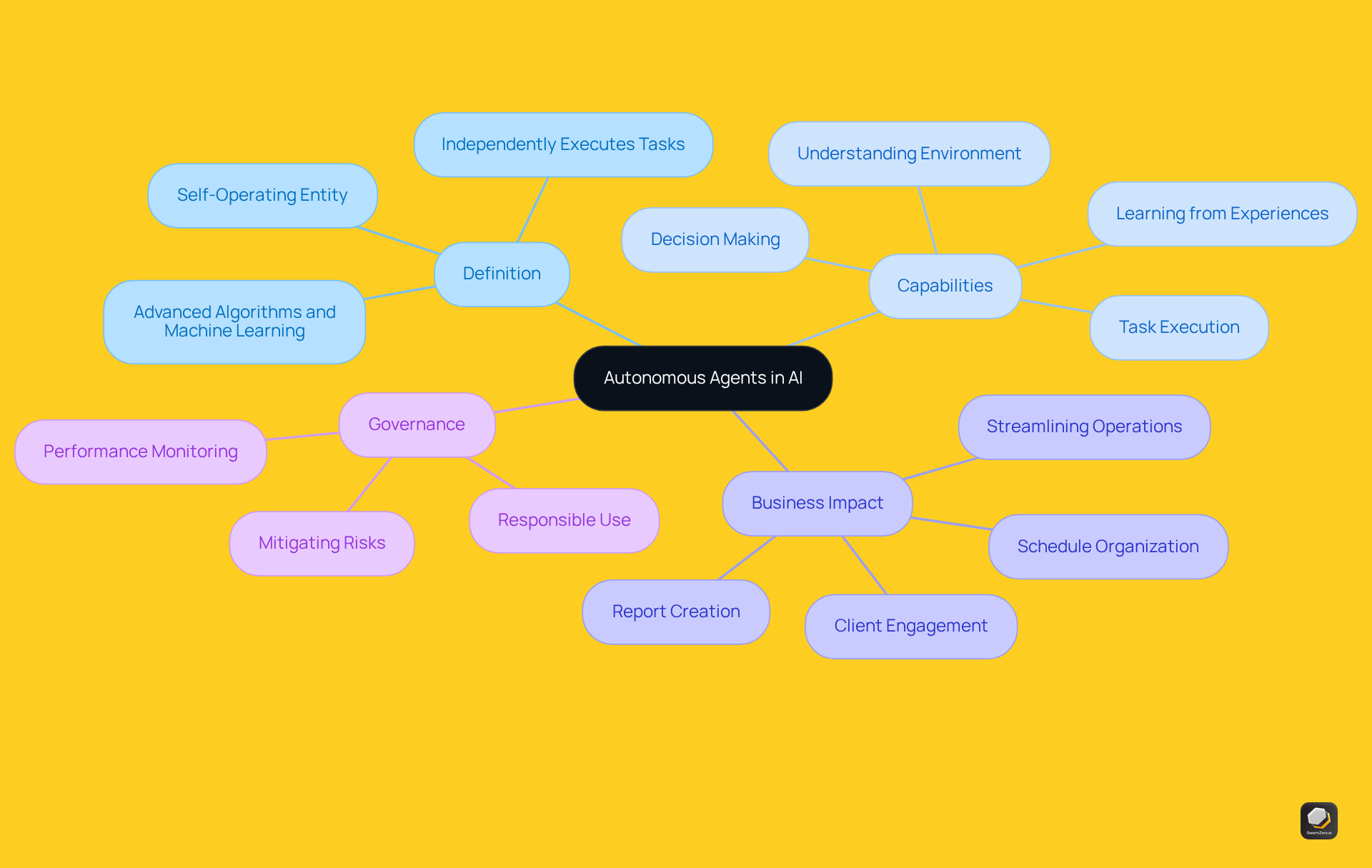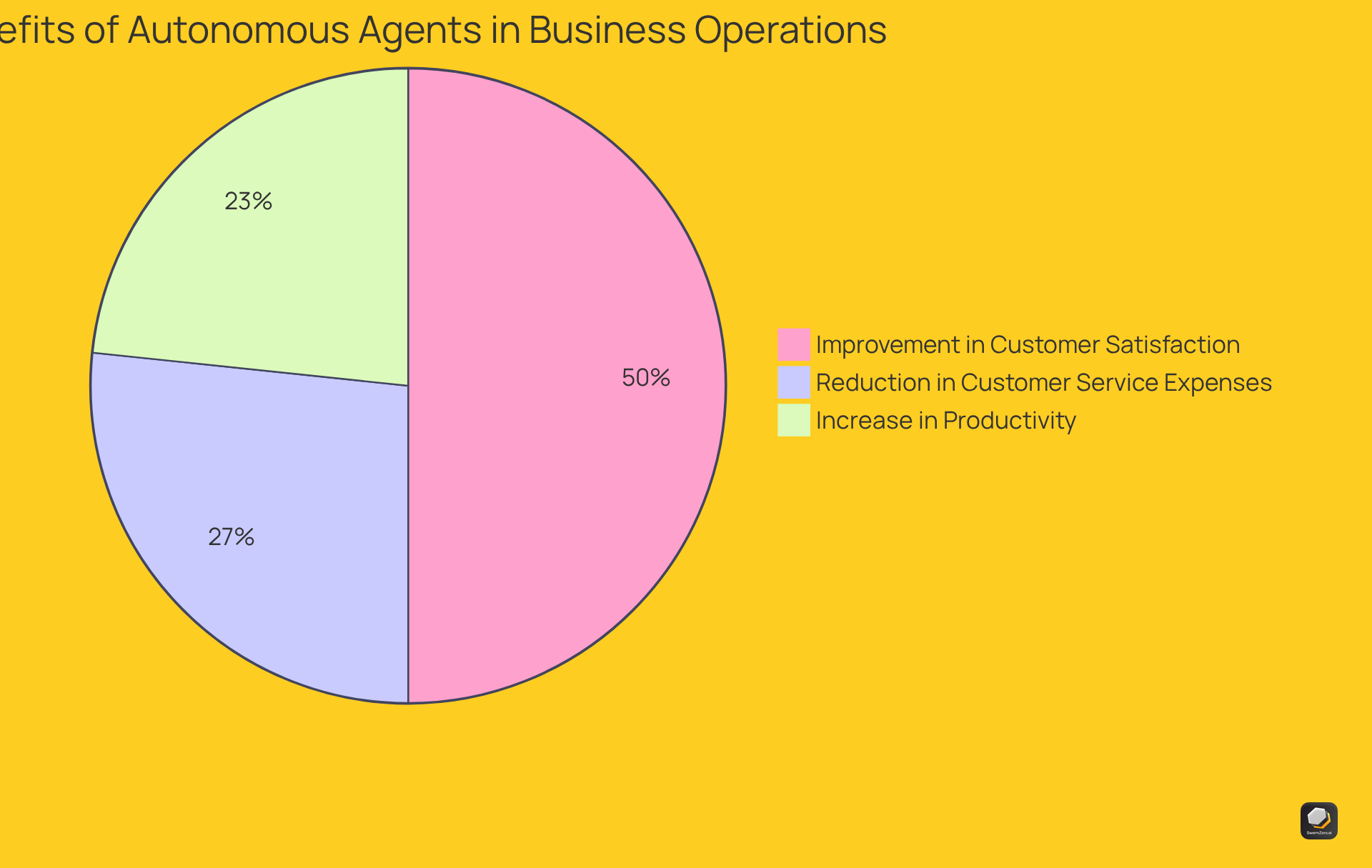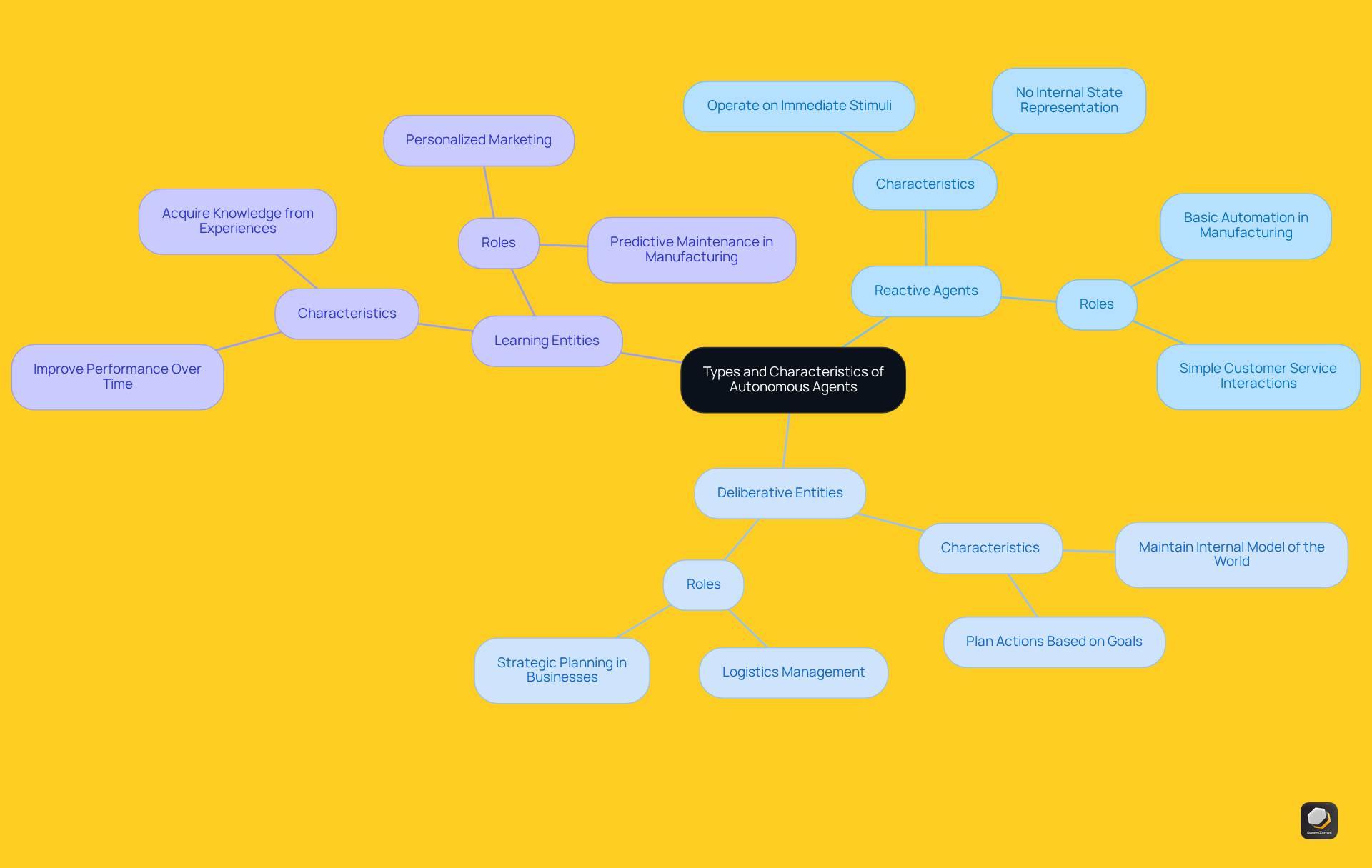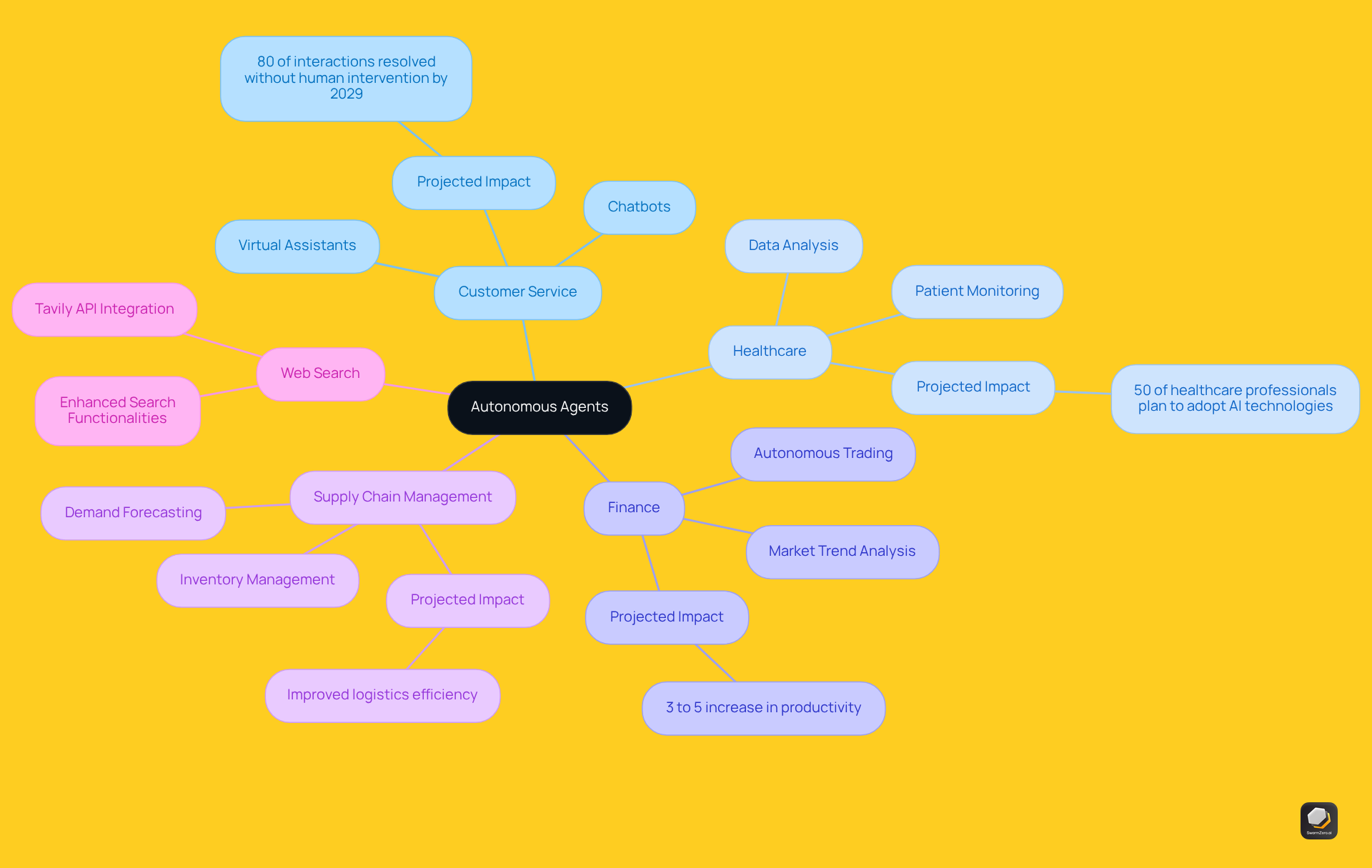What is an Autonomous Agent in Artificial Intelligence?
Discover what an autonomous agent in artificial intelligence is and its impact on various industries.

Key Highlights:
- Autonomous agents are self-operating entities capable of executing tasks independently without human assistance.
- They utilise advanced algorithms and machine learning to adapt and learn from experiences, enhancing their efficiency.
- By 2025, many enterprises are expected to adopt self-operating systems for tasks like report generation and client engagement.
- Autonomous agents improve operational productivity, with companies reporting a 35% increase and a 40% reduction in customer service costs.
- Types of autonomous agents include reactive agents, deliberative entities, and learning entities, each serving distinct roles.
- Key characteristics of autonomous agents are autonomy, adaptability, and learning capability.
- Applications include customer service (chatbots), healthcare (patient monitoring), finance (market analysis), and supply chain management.
- Projections indicate that by 2029, 80% of customer interactions will be handled by autonomous agents.
- Governance frameworks are essential for the responsible use of autonomous agents to mitigate risks.
Introduction
The emergence of autonomous agents in artificial intelligence signifies a pivotal shift in task management across various sectors. These self-operating entities not only enhance efficiency but also redefine workflows by executing complex tasks independently—ranging from automating customer service interactions to optimising supply chain logistics.
As organisations increasingly rely on these intelligent systems, critical questions arise regarding their governance and the implications of their integration into everyday operations.
What challenges and opportunities do these autonomous agents present in the pursuit of innovation and operational excellence?
Define Autonomous Agents in AI
What is an autonomous agent in artificial intelligence refers to a self-operating entity that represents a sophisticated system designed to execute tasks independently, without human assistance. These systems illustrate what is an autonomous agent in artificial intelligence, as they possess the capability to understand their environments, make informed decisions, and perform actions aligned with specific objectives. By leveraging advanced algorithms and machine learning techniques, what is an autonomous agent in artificial intelligence allows them to adapt and learn from their experiences, enabling them to manage complex tasks efficiently.
In 2025, a significant number of enterprises embraced self-operating systems to autonomously create reports, organise schedules, and engage with clients. This capability not only streamlines operations but also enhances overall productivity, as these entities continuously refine their performance through feedback and learning. The integration of self-operating entities, which exemplifies what is an autonomous agent in artificial intelligence, is transforming workflows across multiple sectors and showcasing their potential to revolutionise business processes.
Organisations must also consider governance frameworks to ensure the responsible use of these technologies. By implementing such measures, they can harness the full potential of self-operating systems while mitigating risks associated with their deployment.

Context and Importance of Autonomous Agents
The rise of self-directed entities is fundamentally connected to understanding what is an autonomous agent in artificial intelligence and advancements in machine learning. As organisations strive to enhance productivity and reduce operational expenses, these representatives have become essential resources. They play a vital role in sectors such as client service, healthcare, and finance, excelling at:
- Automating repetitive tasks
- Analysing vast amounts of data
- Providing actionable insights
For instance, companies employing AI technologies have reported a 35% increase in overall productivity and a 40% reduction in expenses related to customer service roles. By enabling teams to focus on strategic initiatives instead of routine operations, autonomous systems significantly improve operational efficiency and effectiveness.
Expert insights indicate that more than 60% of repetitive enterprise workflows will be overseen by AI systems by 2025, underscoring their increasing significance in contemporary business practises. Furthermore, organisations that have adopted these technologies are witnessing substantial improvements in customer satisfaction, with 75% reporting enhanced scores post-implementation. This trend illustrates what is an autonomous agent in artificial intelligence, highlighting their crucial function in promoting innovation and operational excellence across various sectors.

Types and Characteristics of Autonomous Agents
What is an autonomous agent in artificial intelligence can be categorised into several types based on their functionalities and decision-making processes, with each type serving distinct roles in various applications.
-
Reactive Agents: These agents operate based on immediate stimuli from their environment, lacking an internal state representation. They are typically employed for straightforward tasks, such as basic automation in manufacturing or simple customer service interactions.
-
Deliberative Entities: In contrast to reactive entities, deliberative entities maintain an internal model of the world, allowing them to plan actions based on their goals and accumulated knowledge. This capability makes them suitable for complex decision-making scenarios, such as logistics management and strategic planning in businesses.
-
Learning Entities: These entities improve their performance over time by acquiring knowledge from previous experiences and adjusting their strategies accordingly. They are particularly valuable in dynamic environments where continuous improvement is essential, such as in personalised marketing or predictive maintenance in manufacturing.
Key characteristics of autonomous agents include:
- Autonomy: They can operate independently, making decisions without constant human intervention.
- Adaptability: Independent entities can modify their behaviour according to alterations in their surroundings, enhancing their performance over time.
- Learning Capability: They possess the ability to learn from interactions, refining their processes to enhance efficiency and effectiveness.
For instance, in the healthcare sector, AI systems are automating 89% of clinical documentation tasks, significantly enhancing provider efficiency. In retail, 69% of businesses utilising AI tools report substantial revenue growth due to personalised shopping experiences. These examples demonstrate how various kinds of self-operating entities are changing industries by improving operational efficiency and client interaction.

Applications and Use Cases of Autonomous Agents
The integration of self-governing entities into various applications across multiple sectors raises the question of what is an autonomous agent in artificial intelligence, showcasing their adaptability and efficiency. Key use cases include:
- Customer Service: Chatbots and virtual assistants now effectively manage customer inquiries, delivering instant responses and support. Projections suggest that by 2029, 80% of customer interactions will be resolved without human intervention, positioning these representatives to redefine customer engagement.
- Healthcare: In the healthcare sector, autonomous entities are vital for patient monitoring, data analysis, and diagnostics. Nearly 50% of healthcare professionals intend to adopt AI technologies, which can significantly enhance patient care by streamlining processes and improving information access.
- Finance: Autonomous entities are revolutionising the finance industry by analysing market trends, executing trades, and managing investment portfolios autonomously. This capability not only enhances investment strategies but also contributes to an anticipated 3% to 5% increase in productivity within the sector.
- Supply Chain Management: These representatives improve logistics by forecasting demand, managing inventory, and coordinating deliveries, which is essential for maintaining efficiency in an increasingly complex global market.
- Web Search: Leveraging the Tavily API, AI-driven web search tools built on the SwarmZero framework provide enhanced search functionalities, simplifying information retrieval for businesses.
Understanding what is an autonomous agent in artificial intelligence reveals how their adaptability, especially in those built on the SwarmZero framework, allows them to utilise unique features that enhance their performance across various tasks. This makes them invaluable assets in contemporary business operations, driving efficiency and innovation across industries.

Conclusion
Autonomous agents in artificial intelligence represent a transformative force in task execution across various sectors. These self-operating systems function independently, making informed decisions and adapting to their environments to achieve specific objectives. Their integration into business processes streamlines operations and enhances productivity, demonstrating their profound impact on modern workflows.
Throughout the exploration of autonomous agents, key points regarding their capabilities, types, and applications have emerged. From automating repetitive tasks to providing actionable insights in sectors such as healthcare, finance, and customer service, these agents reshape industries by improving operational efficiency. Their ability to learn from experiences and adapt to changing conditions underscores their significance, as businesses increasingly rely on these technologies to drive innovation and excellence.
As organisations continue to embrace the potential of autonomous agents, establishing governance frameworks becomes paramount. Responsible use of these technologies enables businesses to harness their full capabilities while mitigating associated risks. The journey toward integrating autonomous agents is not merely about technological advancement; it is a crucial step toward redefining operational landscapes and enhancing overall effectiveness in today's competitive environment.
Frequently Asked Questions
What is an autonomous agent in artificial intelligence?
An autonomous agent in artificial intelligence is a self-operating entity designed to execute tasks independently without human assistance. These systems can understand their environments, make informed decisions, and perform actions aligned with specific objectives.
How do autonomous agents learn and adapt?
Autonomous agents leverage advanced algorithms and machine learning techniques to adapt and learn from their experiences, enabling them to manage complex tasks efficiently.
What are some applications of autonomous agents in businesses?
In 2025, many enterprises adopted self-operating systems to autonomously create reports, organise schedules, and engage with clients, streamlining operations and enhancing overall productivity.
How do autonomous agents improve business processes?
Autonomous agents continuously refine their performance through feedback and learning, which transforms workflows across multiple sectors and showcases their potential to revolutionise business processes.
What should organisations consider when using autonomous agents?
Organisations must consider governance frameworks to ensure the responsible use of autonomous technologies, allowing them to harness their full potential while mitigating associated risks.
List of Sources
- Define Autonomous Agents in AI
- Microsoft to roll out new autonomous AI agents next month, fending off challenge from Salesforce (https://nbcnews.com/business/business-news/microsoft-roll-new-autonomous-ai-agents-month-fending-challenge-salesf-rcna176413)
- Autonomous agents and profitability to dominate AI agenda in 2025, executives forecast (https://reuters.com/technology/artificial-intelligence/autonomous-agents-profitability-dominate-ai-agenda-2025-executives-forecast-2024-12-12)
- AI agents — what they are, and how they'll change the way we work - Source (https://news.microsoft.com/source/features/ai/ai-agents-what-they-are-and-how-theyll-change-the-way-we-work)
- AI Agents in 2025: Expectations vs. Reality | IBM (https://ibm.com/think/insights/ai-agents-2025-expectations-vs-reality)
- Autonomous AI Agents Are Coming: Why Trust and Training Hold the Keys to Their Success (https://salesforce.com/news/stories/ai-training-trust)
- Context and Importance of Autonomous Agents
- AI Agents Statistics & Market Trends For 2025: Growth & Impact (https://allaboutai.com/ai-agents/statistics)
- 25+ AI Agent Statistics Mirroring the 2025 Market! (https://experro.com/blog/ai-agent-statistics)
- AI Agents Statistics: Usage Insights And Market Trends (2025) | SellersCommerce (https://sellerscommerce.com/blog/ai-agents-statistics)
- AI Agents Statistics: Usage And Market Insights (https://litslink.com/blog/ai-agent-statistics)
- 200+ AI Agent statistics for 2025 (https://pragmaticcoders.com/resources/ai-agent-statistics)
- Types and Characteristics of Autonomous Agents
- AI Agents Statistics: Usage Insights And Market Trends (2025) | SellersCommerce (https://sellerscommerce.com/blog/ai-agents-statistics)
- AI Agents Statistics: Usage And Market Insights (https://litslink.com/blog/ai-agent-statistics)
- 30+ Powerful AI Agents Statistics In 2025: Adoption & Insights (https://warmly.ai/p/blog/ai-agents-statistics)
- What are AI agents: The Complete 2025 Guide to Autonomous, Agentic AI (https://elvenite.se/en/articles/ai-agents-guide)
- 200+ AI Agent statistics for 2025 (https://pragmaticcoders.com/resources/ai-agent-statistics)
- Applications and Use Cases of Autonomous Agents
- 59 AI customer service statistics for 2025 (https://zendesk.com/blog/ai-customer-service-statistics)
- AI Agents in Healthcare: Top Trends and Use Cases (https://blog.workday.com/en-us/ai-agents-in-healthcare-top-trends-and-use-cases.html)
- AI Agents Statistics: Usage And Market Insights (https://litslink.com/blog/ai-agent-statistics)
- Gartner Predicts Agentic AI Will Autonomously Resolve 80% of Common Customer Service Issues Without Human Intervention by 2029 (https://gartner.com/en/newsroom/press-releases/2025-03-05-gartner-predicts-agentic-ai-will-autonomously-resolve-80-percent-of-common-customer-service-issues-without-human-intervention-by-20290)
- 61 AI Customer Service Statistics in 2025 (https://desk365.io/blog/ai-customer-service-statistics)




